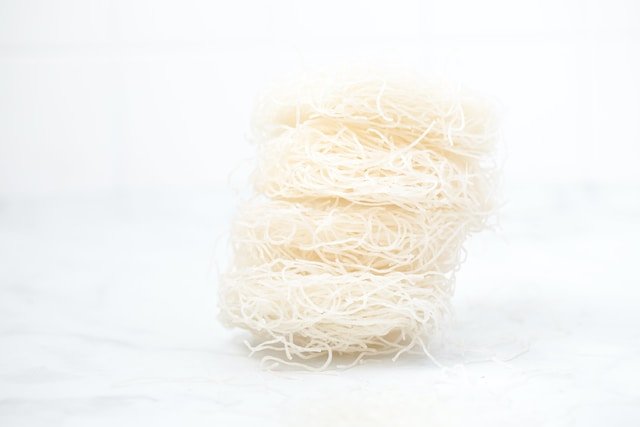If you are a vegan or someone who is considering a plant-based diet, you may be wondering if rice noodles are a vegan-friendly food. Rice noodles are a popular ingredient in many Asian cuisines, such as Thai, Chinese, and Vietnamese, and are often used in dishes like stir-fries, soups, and salads. In this article, we will explore the ingredients and manufacturing process of rice noodles to determine if they are vegan.
What Are Rice Noodles?
Rice noodles are made from rice flour and water, and they are a type of noodle that is commonly used in Asian cuisine. Rice noodles come in different shapes and sizes, such as vermicelli, flat rice noodles, and rice sticks, and they are often used in dishes like Pad Thai, pho, and spring rolls.
Rice noodles are a popular alternative to wheat noodles for people who are gluten intolerant or have celiac disease because they are naturally gluten-free. They are also a good source of carbohydrates and are low in fat and sodium.
Ingredients in Rice Noodles
The ingredients in rice noodles are relatively simple, consisting of rice flour and water. Rice flour is made from milled rice grains, and it is commonly used in Asian cuisine to make a variety of foods, including noodles, dumplings, and desserts.
Most rice noodles are made with just two ingredients: rice flour and water. However, some manufacturers may add other ingredients to the noodles to enhance their texture, flavor, or appearance. For example, some rice noodles may contain tapioca starch or cornstarch, which can improve the texture of the noodles and make them more elastic.
In addition, some manufacturers may use additives like preservatives, coloring agents, or flavor enhancers in their rice noodles. These additives may not be vegan-friendly, so it is important to check the label of the rice noodles before purchasing them.
Manufacturing Process of Rice Noodles
The manufacturing process of rice noodles involves several steps, including milling the rice, mixing the rice flour and water, and shaping the noodles. The process can vary slightly depending on the type of rice noodle being made and the manufacturer’s specific methods.
Milling the Rice
The first step in making rice noodles is milling the rice. The rice grains are first cleaned to remove any impurities or debris, and then they are milled to remove the outer layer of the rice, leaving only the starchy endosperm. The rice flour that is produced is then used to make the rice noodles.
Mixing the Rice Flour and Water
Once the rice flour has been produced, it is mixed with water to form a dough. The dough is kneaded to ensure that the rice flour and water are thoroughly combined and to develop the gluten-free structure of the noodles.
Shaping the Noodles
After the dough has been kneaded, it is shaped into the desired form of the rice noodle. This can be done by hand, or with the use of specialized equipment like a noodle press or extruder. The noodles are then cut to the desired length and size.
Are Rice Noodles Vegan?
Based on the ingredients and manufacturing process of rice noodles, they are generally considered to be vegan-friendly. Rice noodles are made from rice flour and water, which are both plant-based ingredients. They are also gluten-free, which makes them suitable for people with gluten intolerance or celiac disease.
However, as mentioned earlier, some manufacturers may add non-vegan ingredients or additives to their rice noodles, such as eggs, fish sauce, or flavor enhancers derived from animal sources. Therefore, it is important to read the ingredient label carefully before purchasing rice noodles to ensure that they are vegan.
Tips for Choosing Vegan Rice Noodles
When choosing rice noodles as a vegan, there are a few things to keep in mind to ensure that the noodles are vegan-friendly:
- Check the Ingredients Label: Look for rice noodles that only contain rice flour and water, or other plant-based ingredients. Avoid noodles that contain eggs, fish sauce, or other non-vegan additives.
- Look for Vegan Certification: Some rice noodles may have a vegan certification label on their packaging, indicating that they are free from animal products and have not been tested on animals.
- Consider the Manufacturing Process: Choose rice noodles that are manufactured in a facility that is dedicated to producing vegan products. This can help to ensure that the noodles are not contaminated with non-vegan ingredients.
- Check for Cross-Contamination: If you have a severe food allergy or intolerance, be sure to check if the rice noodles have been manufactured in a facility that also processes non-vegan products. Cross-contamination can occur, which may make the noodles unsuitable for consumption.
In conclusion, rice noodles are generally considered to be vegan-friendly, as they are made from plant-based ingredients and are gluten-free. However, it is important to check the ingredient label carefully and look for vegan certification to ensure that the noodles are free from non-vegan additives. By following these tips, vegans can enjoy delicious and nutritious rice noodle dishes as part of their plant-based diet.

